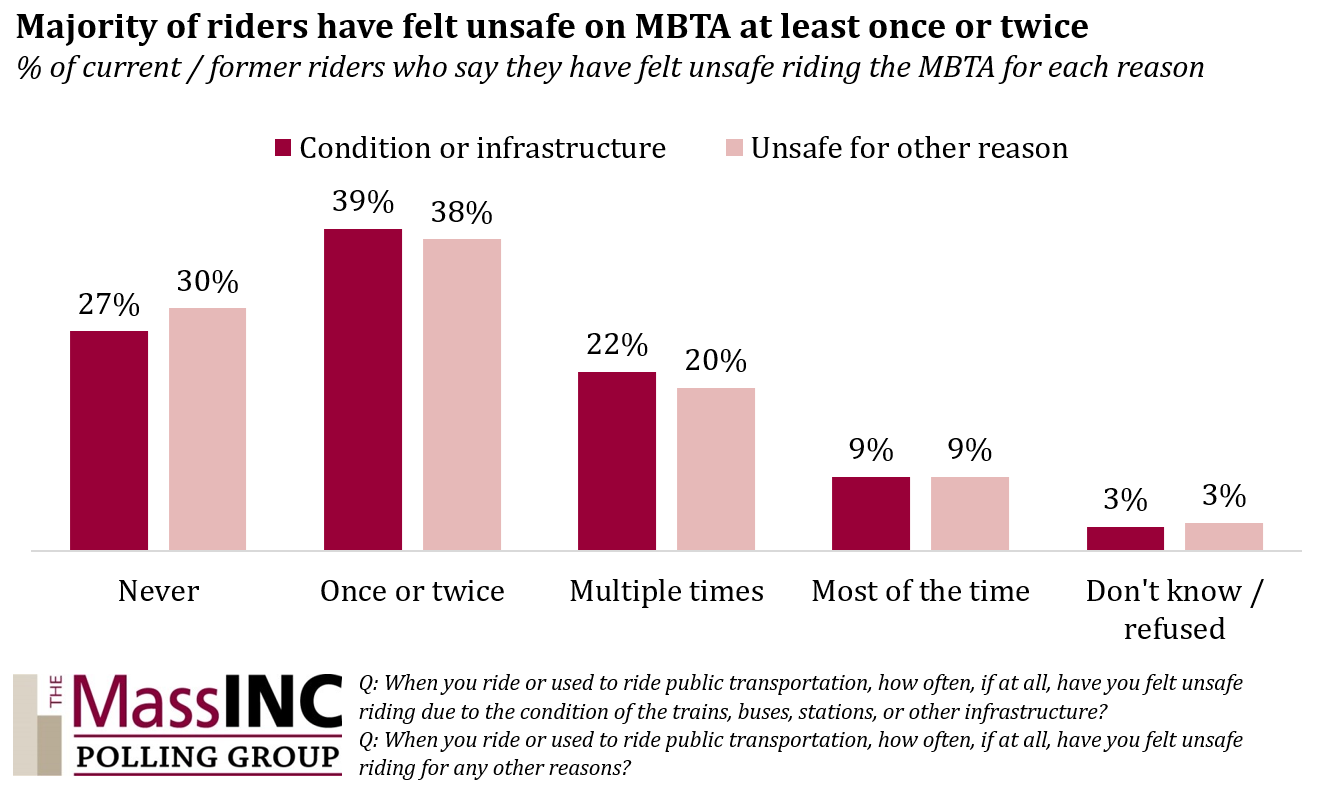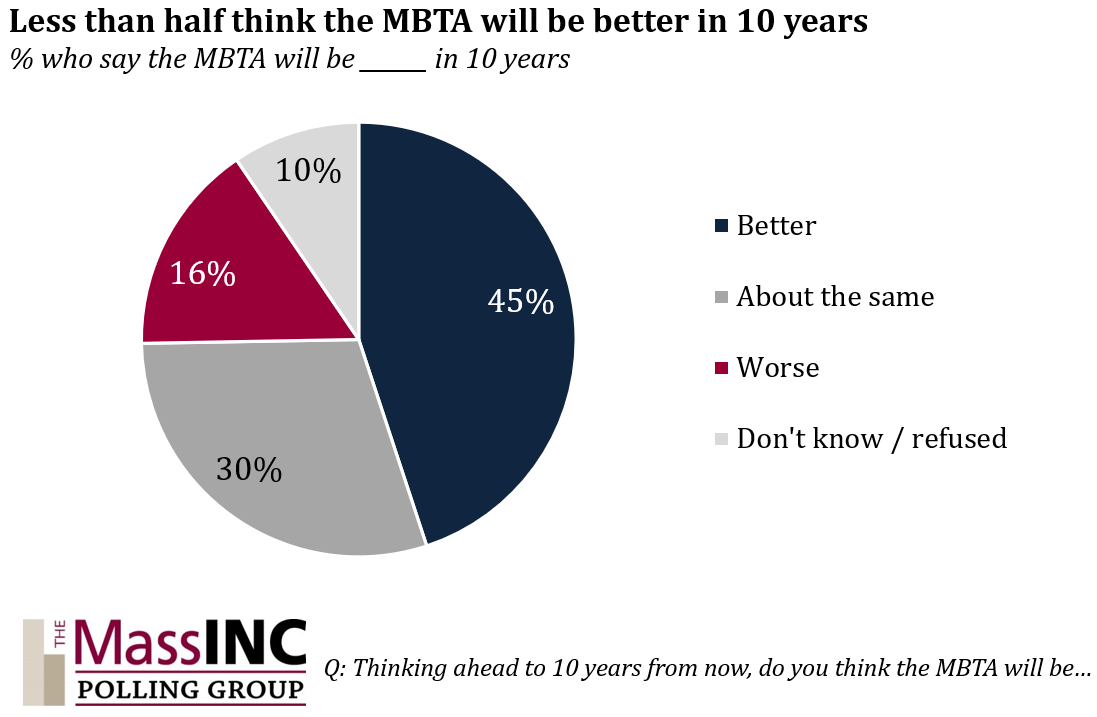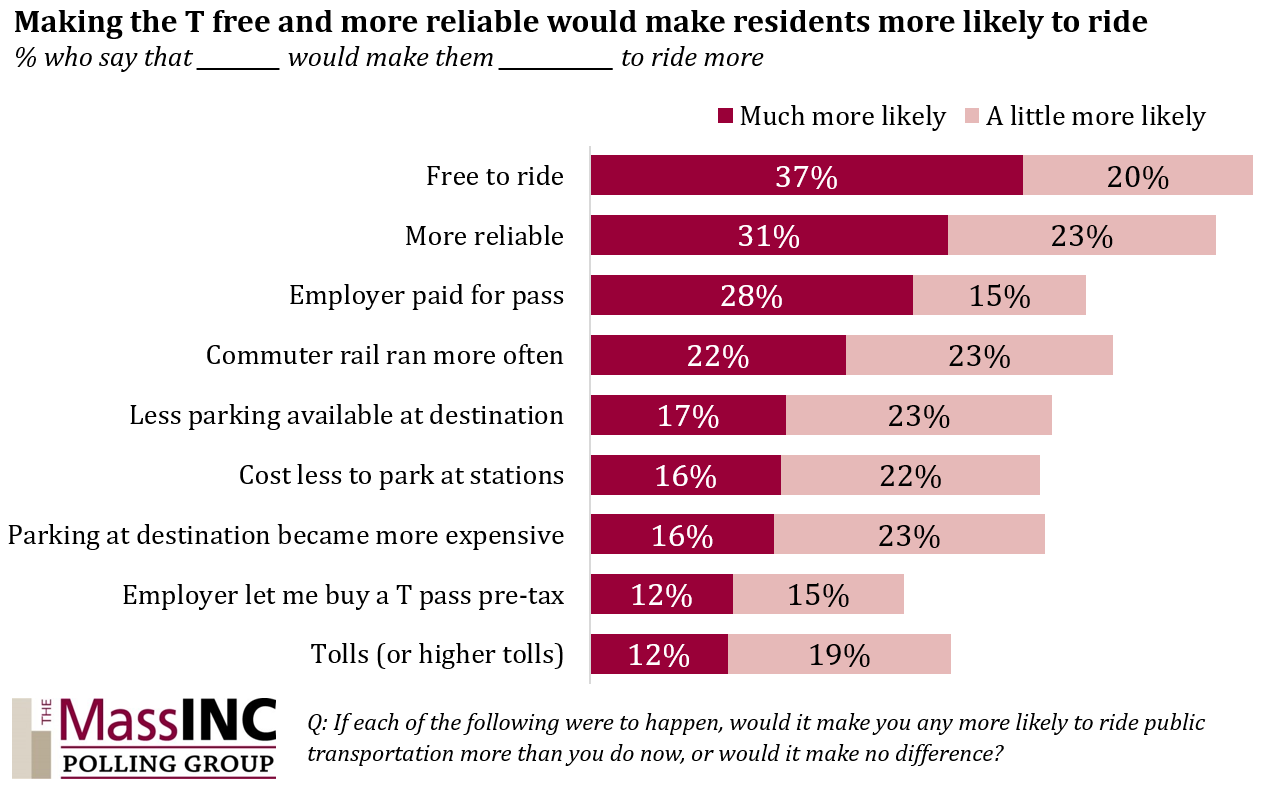Poll: Residents sound the alarm on MBTA service quality, safety
Making the T free, more reliable could boost ridership, residents say.
As Governor Healey and new MBTA General Manager Philip Eng work to improve service at the transit system, a new poll of the region the T serves suggests they have their work cut out for them. Less than half of residents in the MBTA service area rate each service type as good or excellent, including just 28% for the subway. Following a string of high profile safety incidents and investigations, majorities of current and former riders say they have felt unsafe on the system. And while 45% think the T will be better 10 years from now, an equal number think it will be the same or worse. When asked what changes would get them to ride more often, two stood out: making T service free, and making it more reliable.
That’s according to a new poll of 1,000 residents of the 175 communities served by the MBTA conducted by The MassINC Polling Group (MPG) and sponsored by the Barr Foundation. The survey was conducted in mid-August, prior to news of Red Line shutdowns this fall and last week’s safety report revealing inspection lapses led to the slow zones that have affected various subway lines over the past year.
Low ratings for MBTA services, especially the subway
Among the T’s four main services, the commuter rail received the best rating, with 46% of residents rating it good to excellent. But only 35% rated bus service as at least good, and only 28% felt the same about the subway and trolley network. Majorities of current riders of each service think the bus (59%) and commuter rail (63%) are at least good, but only 36% of current subway riders think the same of subway service.
Concerns about safety appear to be weighing down overall ratings. A majority of current and former riders have felt unsafe at least once or twice due to the condition of the T’s infrastructure (70%) or for other reasons (67%). Riders who have felt unsafe multiple times give each T service lower ratings, a sign that concerns about safety are an important part of overall impressions of the system.
Looking ahead, a plurality (45%) say that they think the MBTA will be “better” in 10 years, while about as many think the MBTA will be “about the same” (30%) or “worse” (16%). Again, safety appears to be a factor. Riders who have felt unsafe on the T multiple times are less likely to think the T will improve and more likely to think it will be worse a decade from now.
Making service free, more reliable could bring riders back
MBTA ridership has not returned to pre-pandemic levels, and the poll sheds some light on why. Overall, 32% of residents surveyed are currently riding at least one MBTA service, while 17% rode the T pre-COVID but no longer do so regularly. And 37% of current riders say they are riding the T less than they did before the pandemic.
When asked why they are riding less, the top reasons these less-frequent riders cited were working from home (19%), choosing some other mode of travel (18%), and concerns about the speed and reliability of T service (15%). As one respondent put it: “I have been traveling into Boston less, plus the Red Line runs so slow these days.” Former riders’ top reasons for no longer riding are similar: 23% drive or use another mode of transportation now, and 16% because of issues with the reliability or speed of the MBTA. “Because I can't depend on it,” said one former rider. “It's not on time and it's unsafe.”
With 21% of workers reporting they work remotely every day and 25% a few times a week, the T’s ridership ceiling is likely lower than it was before the pandemic. Still, majorities of residents said that making the MBTA free (57%) and making it more reliable (54%) would make them more likely to ride more than they are now. Increasing the frequency of the commuter rail would also move the needle, particularly among current riders. Half (52%) of workers said their employer buying them a T pass would make them more likely to ride. Current and former riders were more likely to say they would increase their ridership than those with no history of riding.
Sumner closure was felt most strongly closer to Boston
The survey was conducted in August, during the closure of the Sumner Tunnel under Boston Harbor. Overall, 35% of residents said their travel had been impacted by the Sumner shutdowns, including 43% in Suffolk County. These impacts diminished further out, just 25% of residents beyond Route 495 reporting disruptions. Nonetheless, these figures represent millions of residents and illustrate the impact of closing key transportation routes. A majority (56%) had heard at least “a little” about the T’s free and reduced cost service to help mitigate traffic during the shutdown. When told about those offerings, 44% said they were at least somewhat likely to ride the T instead of driving during the shutdown, including 56% in Suffolk County.
About the poll
These results are based on a survey of 1,000 Massachusetts residents who live in the 175 communities served by MBTA. Responses were collected by online survey and live interviews via landline and cell phones August 14-20, 2023. The data were weighted to reflect known and estimated population parameters for race, age and gender, education, geography, and party identification. The credibility interval for this survey is +/- 3.3 percentage points for the entire sample, including the design effect. This project was conducted by The MassINC Polling Group and sponsored by The Barr Foundation.




